Waste Container Systems Brings Durable, Modular Dumpsters to Market
The innovative dumpsters are lightweight, collapsible and easy to repair and ship.
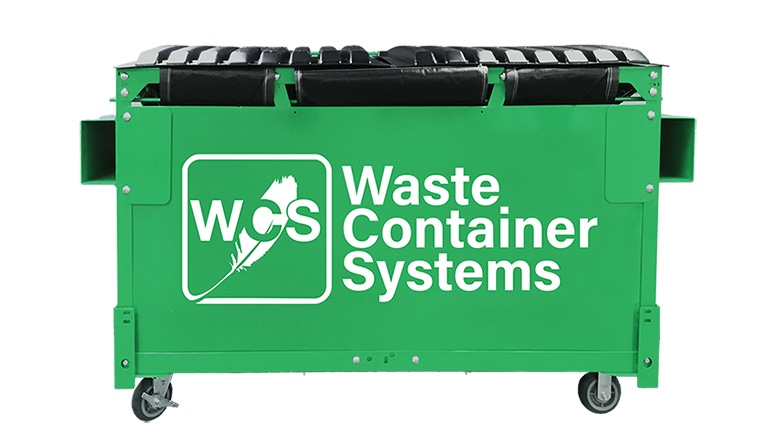
The waste industry experts behind GarbageMan and TrashBolt Software are working to revolutionize the commercial dumpster market by developing a new dumpster that solves many of the problems inherent in existing models, such as weight, repairs, shipping and storage.
Waste Container Systems (WCS), based in Minnesota, is the brainchild of G. Wayne Molck, Andy Sorensen and Jon Huber, and its first product offering is a durable and modular dumpster that’s lightweight, collapsible and easy to repair and ship.
Waste360 recently sat down with Huber, product specialist and sales, and Sorensen, vice president, to discuss Waste Container Systems’ dumpsters, what makes them innovative and what testing was done to ensure they can keep up with the nature of the waste industry.
Waste360: How did WCS come about and how long has the company been in business?
Andy Sorensen: We ran a garbage company prior to this business, GarbageMan, that provided residential and commercial services to areas in Minnesota, Colorado and South Dakota. We were in that business for nine years and grew it to 75,000 customers before eventually selling it. While running GarbageMan, we learned that traditional steel and polyethylene (poly) dumpsters had some limitations with regards to weight, shipping, storage and maintenance. With these issues in mind, we designed a new version of the dumpster that could fold for shipping and storage, weighed much less than steel models and was easy to maintain onsite.
We started WCS about five years ago with our initial prototypes and worked through engineering and testing for about four years. At that point, we applied for and were granted a patent for our design. We officially launched the product this past May at WasteExpo.
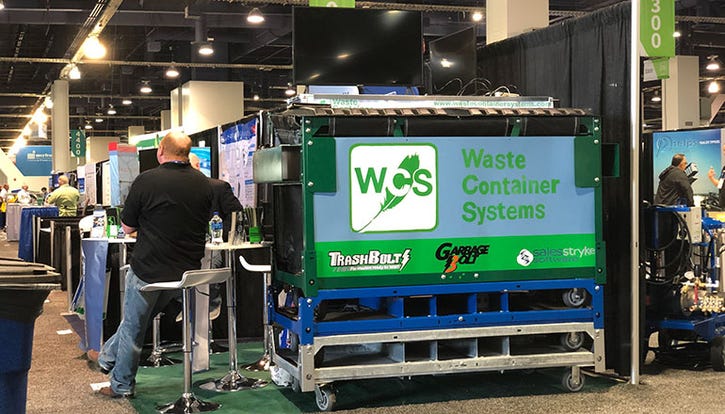
Waste360: Tell us about WCS’ product and how it’s different than others on the market.
Jon Huber: The bag and the frame are really what make this product different. The weight of the dumpster is considerably less than steel and poly, and we made it collapsible for shipping and storage purposes. The other thing that sets the product apart is durability and strength.
We tested the dumpster here in Minnesota in all types of weather, and we found that the lighter weight and the softer wheels make the dumpsters easier to move around through rain, snow, rocks, sand, etc.
The modular design means that the product can be repaired onsite, so the dumpster is never out of service. Our rust-proof bag and easy onsite maintenance make it an ideal product for haulers on the coasts who must deal with rusting caused by the salt air.
Andy Sorensen: The number one issue with steel dumpsters is that the bottoms rust out and for poly models it is cracking. We solved these problems by using a super strong, durable poly bag inside of a high-strength, galvanized steel frame. The bags do not rust or crack in cold weather and prevent waste materials from contacting the steel frame. The bags were made for our product and are a modified version of an agricultural product bag designed to hold thousands of pounds of grain, corn, etc.
Waste360: What makes WCS’ dumpster innovative?
Jon Huber: Not only is our dumpster new and really breaking the industry with its ability to do the job better than its steel and poly competitors, but it’s also paired with smart technology. Working with TrashBolt, our software company, we have designed a system that uses QR codes [quick response] on the dumpster that allows users to access the hauler’s website to request services such as pickups, maintenance, access and pay bills, etc.

Our dumpsters are also modular, which make them easier to ship, stack, store and repair. Should there ever be a problem with the bag, it can be replaced in a matter of minutes. They can even be delivered with a pickup truck.
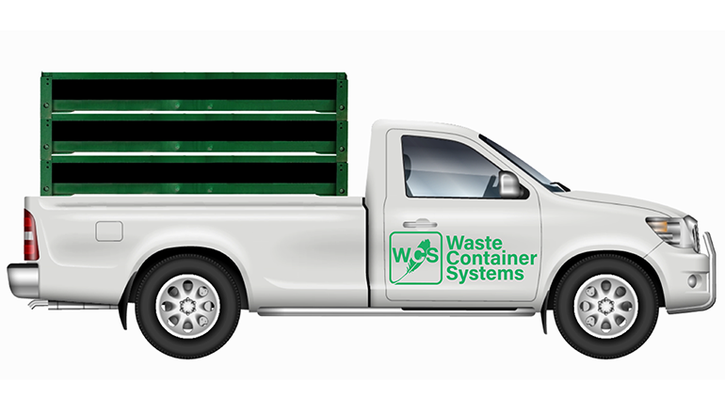
Waste360: How long did it take to develop the product, and what type of testing did you do?
Jon Huber: We developed the product in about three years and were able to test it out at GarbageMan before we sold the company. Our first design was costly and heavy, so we modified it until we had a product that worked and was cost effective. We spent the next two years refining and testing the product.
In that five years of testing, we have never had to replace a bag. This is important for potential customers to know as it is a new product and some have questioned the strength and durability of the bag.
Our testing has proven that our dumpsters are durable and strong, even though they weigh considerably less than steel models.
Andy Sorensen: In addition to testing it ourselves, we were able to give the product to other haulers, like Eureka Recycling and another hauler in St. Paul, Minn., who have been using the dumpsters for three to five years without any breakage. We started testing the bags and dumpsters with 1,000 pounds and recently dumped 2,000 pounds of bagged lava rock into our container from two to three feet above the lip (see photo). Our dumpster exceeded our expectations and suffered very minor damage to the steel mesh bottom and no damage to the bag!
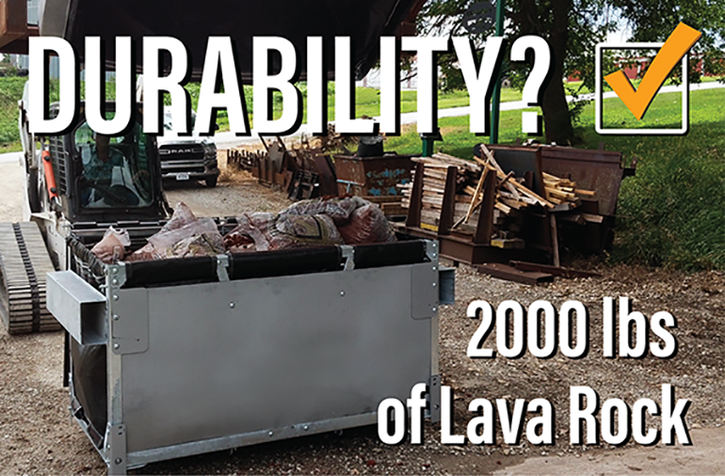
Waste360: Safety is very much top of mind in this industry. How did safety play a role in the design of your dumpster?
Andy Sorensen: We used an engineering team to design the dumpster, and Jon, who ran our operations for GarbageMan, was involved with the early testing of the product.
Jon Huber: On the safety side, one key component is the lightweight design. The dumpsters are designed to roll very easily on hard surfaces, so there’s a reduction on wear and tear on equipment and people. It requires much less effort to move our dumpsters, which we think will result in less injury and fatigue.

Waste360: What have haulers had to say after testing your product?
Andy Sorensen: The feedback has been positive. For example, we have one driver from a national company who is requesting that all the customers on his route have our dumpsters.
Jon Huber: I met a driver at a Burger King, and he said our dumpsters are the best he’s used because they are so easy to move, even with the weight of food waste.
Waste360: Where are WCS’ dumpsters manufactured?
Andy Sorensen: We have two manufacturing plants located in Sidney, Iowa, and Nebraska City, Neb. The bags are manufactured by a company in Lafayette, La., but some of the bags are outsourced.
Waste360: Does it cost less to ship your dumpsters, and do you plan to export your products to other countries?
Andy Sorensen: It’s considerably less, and that’s where we’re competitively priced with competing dumpster manufacturers. We can ship three times the amount than a regular dumpster, so you can factor in three times the savings.
Jon Huber: It’s one of the reasons why we’ve gotten a lot of interest from places like Puerto Rico, Aruba and Guam. Those countries pay so much for their containers because of shipping, but with our modular and collapsible design, they can save on shipping and maintenance costs.
In all our businesses, we’ve never been importers or exporters, so there’s a little bit of a learning curve to ensure we do it right.
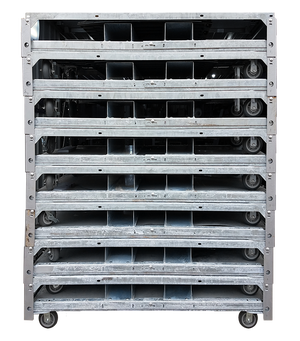
Waste360: What can we expect to see from WCS in the future?
Andy Sorensen: We are continuing to expand our line of products to include front and rear load models in 2-, 3-, 4-, and 6-yard sizes.
The modular design of our dumpsters makes it possible to adapt it to a variety of uses and load type configurations.
Our full line of products will be available by next year’s WasteExpo in New Orleans.
About the Author
You May Also Like




